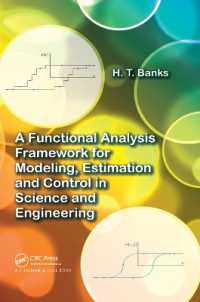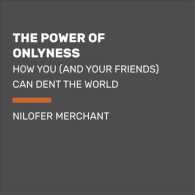- ホーム
- > 洋書
- > 英文書
- > Philosophy
Full Description
A reassessment of the controversial, yet still influential nineteenth-century German philosopher that explores the contentious issue of whether he was, as his critics frequently claim, a nihilist.
Max Stirner (1806-1856) is often regarded as an enfant terrible of nineteenth-century German philosophy, but he has continued to exert an influence despite his marginalization as a nihilist. This study is the first to tackle head-on the question of whether Stirner can indeed reasonably be described as a nihilist. Although he is not known ever to have used the word "nihilism" or any of its derivatives, he was first accused of being a nihilist immediately after the publication of his magnum opus Der Einzige und sein Eigentum (translated in most English editions as The Ego and His Own) in 1844. Since then, the allegation has been repeated by well over a hundred writers and critics, with the result that it has become something of a truism. The book aims, first, to establish a clear understanding of the many meanings of the term nihilism; second, to examine the accusations leveled at Stirner in the light of those meanings; and third, to assess not only the fairness and accuracy of the imputation of nihilism but also its usefulness in understanding Stirner as a thinker. It thus provides new insights into Stirner's thought, challenges the orthodox view of him as a philosophical pariah, reassesses his ideas and their place in the history of philosophy, and addresses the recurrent issue of his contemporary relevance.
Contents
Acknowledgments
Notes on Sources, Abbreviations, Translations, and Spelling
Introduction - Stirner: Sinner or Saint?
1. The Origins of Disrepute: Stirner in Context
2. The Meaning of Nothing: Nihilism's Complex Etymology
3. The Tragic Age for Europe: Nihilism from Nietzsche to Now
4. The Use and Abuse of Nihilism: Stirner under Fire
5. The State of Denial: Stirner and Political Nihilism
6. The Absence of Absolutes: Stirner and Moral Nihilism
7. The Fear of Nothing: Stirner and Existential Nihilism
Conclusion - Stirner: The Happy Nihilist?
Bibliography
Index








